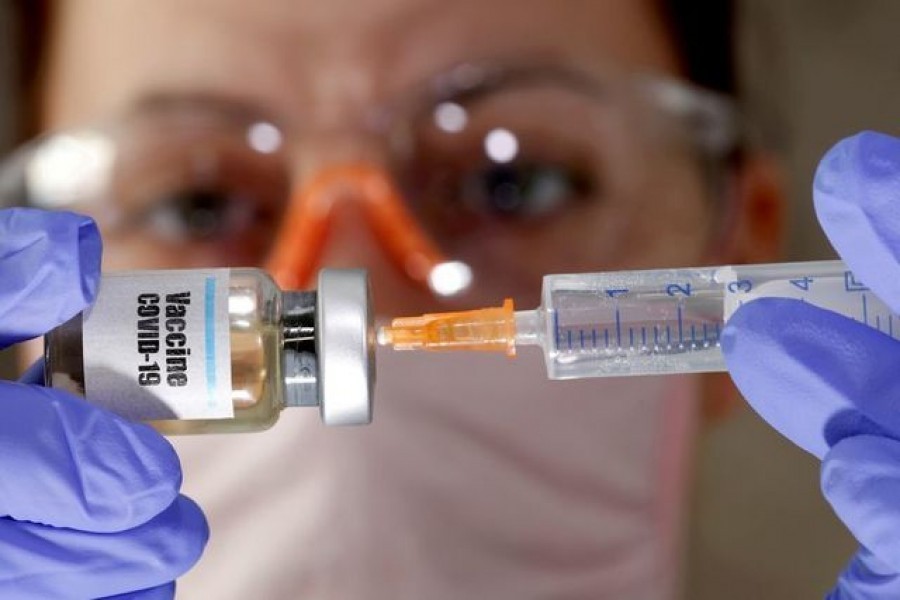
Published :
Updated :

Last week, people in their thousands queued up at various makeshift mass-vaccination centres in Dhaka and elsewhere in the country to get jabs against deadly SARS- CoV-2. But many of them returned home frustrated as the supply of vaccines was very limited.
The government launched mass-vaccination programmes to cover the poor and low-income people who were found unwilling to take the trouble of registering themselves digitally and take the jabs. Health workers administered the vaccine at mass vaccination centres if one could produce his/her national identification card (NID).
It must have pained the authorities that they could not inoculate many people who had come hoping to get the jabs. Until the ongoing second wave of the Covid infection, most of them were found reluctant to get vaccinated. The change of mind might be because of the burst of the myth that the poor and rural people have built-in immunity against the virus, which, they believed, only infects the upper class of people who live in 'air-conditioned' rooms.
The shortage of vaccines is not unique in the case of Bangladesh. Most poor and low and middle-income countries have been facing the same situation. Some countries have funds, but they are unable to buy vaccines immediately. Vaccines manufacturers in developed countries are barred from exporting while producers of the jabs in China, Russia and India cannot meet an ever-increasing demand.
When the poor, low- and middle-income countries have been struggling to vaccinate their population, the rich vaccine manufacturing nations have hoarded vaccines several times more than their requirement and made the advance sale of vaccines to other rich nations worth billions of dollars. It was not enough; it seemed.
They have imposed restrictions not only on the export of vaccines but also on chemicals and other ingredients necessary for manufacturing vaccines. Many have dubbed the actions by wealthy nations as 'vaccine nationalism'. Many poor and middle-income nations had pinned hope on supply from the world's largest vaccine producer like India. But the problems with the supply of ingredients from the USA and the second wave of the pandemic forced that country to stop the export of vaccines, the cheapest in the world. India itself has now become an importer of the item.
A Reuter report circulated on Friday last said the US drug giants Pfizer and Moderna have together locked up over US$60 billion in sales of their vaccines just in 2021 and 2022. The agreements cover the supply of the two initial doses of their vaccines as well as 'billions of dollars in potential boosters for wealthy nations'.
While the US and European countries, on the one hand, have kept the export of vaccines produced by them restricted, they have put up a generous posture before the world, on the other. They, according to a BBC report, have pledged to make available a limited volume of vaccines to the Covax facility, which was created in 2020 to distribute vaccines for protection of at least 20 per cent population in 92 low-or-middle-income countries. The initial goal of Covax was to provide 2.0 billion doses of vaccine worldwide in 2021 and 1.8 billion doses to 92 poorer countries by early 2022. But its pious intention has suffered a jolt because of the non-availability of sufficient doses of vaccine.
The US in June last pledged to make available 500 million doses and the UK 100 million doses to the Covax in phases. The poor and low-income countries, including Bangladesh, have already received some vaccine doses from the Covax, but that is highly insufficient compared to their respective need.
The vaccines produced by Pfizer, and Moderna are very expensive. The poor and low-income countries cannot afford those. The storing of the two vaccines is also a problem. Those need to be preserved at minus 70 degrees centigrade temperature. The vaccine Janssen, manufactured by Johnson and Johnson, is not that expensive as it sells at 10 dollars a dose. Besides, it is a single-dose jab. Bangladesh had decided to procure a large volume of Janssen through Covax, but the latter expressed its inability to help because of the high price demanded by its manufacturer.
The prices of jabs produced by Russian and Chinese companies are also high. Yet Bangladesh is buying those vaccines since there is no alternative to them. Then again, it would take a long time to get the supply of the jabs purchased and inoculate a large population.
Under the circumstances, the best option would have been the local manufacturing of the vaccine with the waiver of intellectual property (IP) rights as it has been happening with the generic medicines. Some Bangladeshi companies have the facilities to manufacture vaccines.
The world is now going through an unprecedented medical emergency. The drug manufacturers and biotech companies concerned deserve high appreciation for developing vaccines against coronavirus within such a short time. But every country should have the right to produce its vaccine and save the lives of its citizens. India and South Africa spearheaded the campaign, which is supported by over 100 countries.
The USA, Russia and China have also come on board to support the move to waive the IP protection on Covid vaccine temporarily. Of course, the WHO and some other international charity organizations are backing the campaign. The opposition from Japan, South Korea, the UK and the EU member countries remains a major stumbling block to such a pious move. Naturally, the drug giants would stand in the way, but if the governments decide they are bound to give in.
The ball now is in the court of the World Trade Organization (WTO). True, some rules would pose obstacles. But the situation in which the world is in and when the trade superpowers are agreeable, the rules could be suspended temporarily for the greater benefit of the world population.


 For all latest news, follow The Financial Express Google News channel.
For all latest news, follow The Financial Express Google News channel.